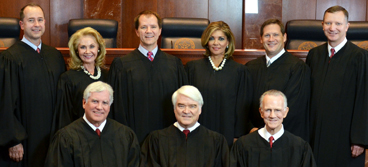© 2017 The Texas Lawbook.
By Janet Elliott
(AUSTIN) Jan. 18 – The Texas Supreme Court heard arguments last week in a dispute between ConocoPhillips and Noble Energy. Although the case ostensibly involves liability for a $63 million oil field cleanup, many energy companies are concerned about its potential effect on the market for energy assets traded in bankruptcy.
The case centers on a 1994 property swap involving Phillips Petroleum and Alma Energy. The swap included common provisions, in which Phillips and Alma agreed to indemnify each other for any cleanup associated with the lands they were exchanging.

In 2010, when the state of Louisiana sued Phillips Petroleum’s successor, ConocoPhillips, on behalf of Cameron Parish schools over environmental contamination in the Johnson Bayou Field, one of the properties Phillips received in the 1994 swap. ConocoPhillips settled with Louisiana for $63 million in 2012, but then turned to Alma’s successor for reimbursement under the indemnity provisions of the original exchange. That successor was Noble Energy.
In 1999, five years after the original exchange, Alma had filed for bankruptcy under Chapter 11. And in 2004, Noble merged with Elysium Energy, a company that had acquired Alma’s contracts and assets. Noble, however, rejected the ConocoPhillips demand, alleging that they knew nothing of the indemnity agreement and that any such provision under the original exchange would have been discharged by the Alma bankruptcy.
When ConocoPhillips sued, a Harris County state district court agreed with Noble and granted summary judgment. That ruling was reversed in 2015 by the 14th Court of Appeals, and Noble appealed to the Texas Supreme Court. And now the court is weighing whether the property-exchange agreement, transacted before Alma filed for Chapter 11 relief, survived both the company’s bankruptcy and Noble’s subsequent merger with Elysium.
In an amicus brief filed by a former bankruptcy judge, energy giants ExxonMobil and Chevron expressed concern that an adverse ruling against ConocoPhillips—and favoring Noble Energy—would undermine the enforceability of contracts assumed in bankruptcy.
“Noble’s position introduces significant market uncertainty into the oil and gas industry, for no good legal or economic reason,” said the brief written by Leif Clark, a former bankruptcy judge in the Western District of Texas.
Noble, in turn, has been supported by Plains All American Pipeline, which says the court of appeals decision “shifts the significant risks associated with unknown and undisclosed liabilities to purchasers in bankruptcy cases” and will discourage participation in future bankruptcy-related transactions.
During the Jan. 12 arguments, the justices mostly listened as lawyers explained the complex series of transactions involving the Johnson Bayou Field. Justices Eva Guzman and Debra Lehrmann are recused from the case.
Thomas C. Wright, who represents Noble, said the property contract was not listed in the bankruptcy asset purchase and Noble had no opportunity to accept or reject the indemnity requirement.
“Nobody goes into bankruptcy court and says we want all their assets and all their liabilities. Then you’re the next one that’s bankrupt,” said Wright of Houston’s Wright & Close.
Wright urged the court to follow the Third U.S. Circuit Court of Appeals 2004 decision in In re Allegheny Health, Education & Research Foundation. The federal appeals court said a bankruptcy asset purchaser was not responsible for paying sick leave that accrued before the purchase.
Omar Alaniz, who represents ConocoPhillips, said the Allegheny case involved obligations that accrued before a bankruptcy while the obligations in the current dispute occurred after the contract was assigned to Noble’s predecessor in Alma’s bankruptcy.
Alaniz, a Dallas partner at Baker Botts, said the 2000 bankruptcy plan explicitly states all executory contracts not rejected are assigned to Elysium, whose parent company merged with Noble in 2004. The 1994 property-swap agreement was not among 132 contracts rejected by Elysium.

Richard Mithoff, who also represents ConocoPhillips, said Noble paid damages to two other school boards under the same indemnity provisions.
“The suggestion that Noble was unaware of these provisions is simply not accurate,” said Mithoff.
© 2017 The Texas Lawbook. Content of The Texas Lawbook is controlled and protected by specific licensing agreements with our subscribers and under federal copyright laws. Any distribution of this content without the consent of The Texas Lawbook is prohibited.
If you see any inaccuracy in any article in The Texas Lawbook, please contact us. Our goal is content that is 100% true and accurate. Thank you.
